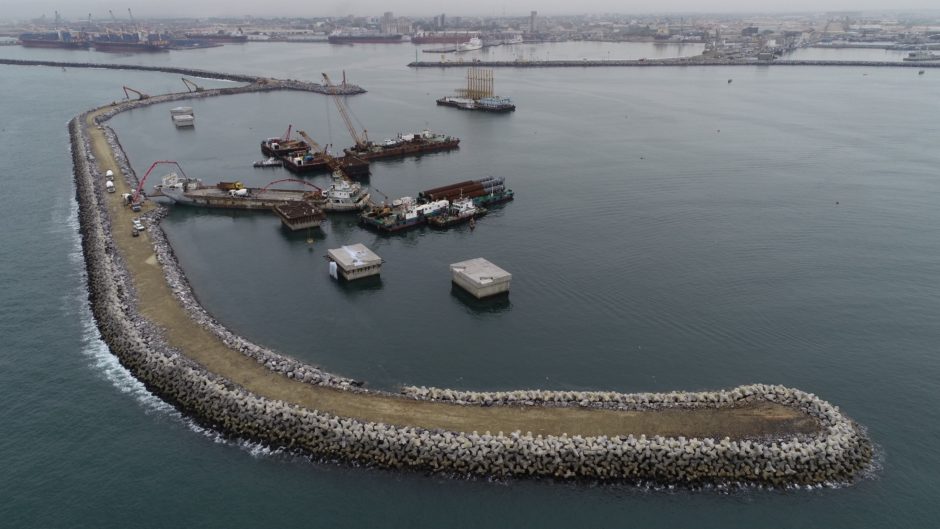
Tema LNG’s floating regasification unit (FRU) has arrived in Ghana.
This paves the way for the first deliveries of LNG to a terminal in sub-Saharan Africa.
“The Tema LNG terminal aims to meet Ghana’s growing energy demand through an innovative yet cost-efficient, reliable supply. Once operational, this FRU will allow the Tema LNG facility to receive, regasify, store and deliver roughly 1.7 million tonnes of LNG a year – 30% of Ghana’s general capacity,” the company’s project manager Edmund Agyeman-Duah said.
Talking to Energy Voice, Agyeman-Duah explained that Tema LNG provided the infrastructure for Shell to supply LNG to Ghana National Petroleum Corp. (GNPC) under a long-term contract.
The state-owned company is expected to sign offtake agreements with independent power producers (IPPs).
With the FRU just out of sight on the horizon, the Tema LNG Terminal Co. (TLTC) official said the next step would be to achieve mechanical completion of the onshore works, with a 6.5 km pipeline and a conditioning station.
“We forecast the commissioning period to be in March, with further performance testing as the terminal becomes operational,” he said. TLTC has notified Shell for the delivery of a commissioning cargo.
Helios Investment Partners and Africa Infrastructure Investment Managers (AIIM) have backed Tema LNG. The presence of Helios and AIIM “played a big role in getting the financiers comfortable”, Agyeman-Duah continued.
Power plans
The facility involves an FRU with an LNG carrier, acting as a floating storage unit (FSU). This combination allows Tema LNG to receive, store and regasify LNG. Jiangnan Shipbuilding, a subsidiary of China State Shipbuilding Corp., built the FRU. The vessel left the Chinese yard at the end of November.
Helios’ Ogbemi Ofuya said the Tema LNG project would support Ghana’s “ambitions to continue on its trajectory as one of the fastest growing economies in Africa, by delivering the energy infrastructure to support accelerated industrialisation”.
The use of LNG “serves as a catalyst for industrial and economic growth. The year-round, guaranteed supply of LNG and piped gas through the Tema LNG terminal facilitates forward planning and investments in receiving infrastructure by power plants, mines and industries across the West Africa region who are currently reliant on more expensive liquid fuels.
“The switch to gas also delivers a significant environmental benefit and supports the transition to cleaner burning fuels in the region by reducing CO2 emissions and eliminating sulphur emissions, in line with the Paris Climate Accord objectives.”
Spain’s Reganosa Servicios is in charge of the operation and maintenance (O&M) of the FRU and FSU. It also oversees the 6 km gas pipeline, which runs from the terminal to Ghana’s pipeline network.
The Emerging Africa Infrastructure Fund (EAIF) committed to providing a $31 million loan to Access LNG in November 2020. The loan was to part finance the FRU. Access LNG is a joint venture of Helios and Gasfin Development.
LNG’s place
Agyeman-Duah was optimistic that LNG would be competitive against other fuels currently in use in Ghana. “There’s a strategic plan to displace liquid fuels. As demand grows, natural gas and LNG use will increase.”
Stakeholders, regulators and financiers were all supportive of the Tema LNG plan, Agyeman-Duah said.
“As a continent it’s important we start to look at opportunities to reduce reliance on high greenhouse gas emitting fuels. We need to be part of the drive to be more environmentally friendly – and LNG provides that opportunity,” Agyeman-Duah said.
The executive was upbeat about seizing the first mover advantage in Ghana, with the terminal playing into the country’s plans to become a regional petroleum hub.
The Tema LNG project is a “proof of concept”, he continued, with the combination of the purpose-built barge and an LNG carrier. Similar projects could be deployed in other places – and the team behind Tema LNG has hopes to pursue just such an opportunity.

